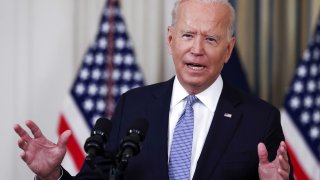
- More than 130,000 businesses across the U.S. are bracing for the Biden administration's rules on Covid vaccination and testing.
- The requirements will apply to roughly two-thirds of the private sector workforce.
- Nearly every Republican state attorney general in the U.S. signed a letter to the president last month vowing to challenge the requirements.
- OSHA delivered its proposal to the Office of Management and Budget on Tuesday night for final review.
Led by Texas Gov. Greg Abbott, Republican-run states are already gearing up to challenge the legality of the Biden administration's vaccine mandate for private companies before the Labor Department has even published the rules.
President Joe Biden last month directed the Occupational Safety and Health Administration, a tiny agency that polices workplace safety for Labor, to write rules requiring private companies with 100 or more employees to vaccinate their staff against Covid-19 or test those who aren't at least once a week.
More than 130,000 businesses across the U.S. are bracing for the new rules, which will apply to roughly two-thirds of the private sector workforce. OSHA told CNBC it delivered its proposal to the Office of Management and Budget on Tuesday night.
"Every day, we see more businesses implementing vaccination requirements, and the mounting data shows that they work. Businesses and organizations that are implementing requirements are seeing their vaccination rates rise by an average of 20% or more to well over 90%," Biden said in addressing the nation Thursday. "Let's be clear, vaccination requirements should not be another issue that divides us."
The rule is expected to take effect soon after OMB completes its review. Because it's being written under emergency procedures, OSHA can shortcut some of the usual regulatory bureaucracy, like a public comment period that would normally delay it by several months. OSHA will likely give companies time to comply with the new mandate before broad enforcement begins, according to Debbie Berkowitz, who served as a chief of staff and senior policy advisor at OSHA during the Obama administration.
Money Report
The U.S. Chamber of Commerce asked the administration for greater clarity on the vaccine and testing requirements in a meeting with White House officials at the Office of Management and Budget on Friday.
"We led off with the very serious concern of our members regarding the possibility of losing employees. That's a very real concern and we were very strong in terms of describing it," said Marc Freedman, a top lobbyist who attended the meeting for the Chamber.
Feeling out of the loop? We'll catch you up on the Chicago news you need to know. Sign up for the weekly Chicago Catch-Up newsletter.
He said the cutoff at 100 employees doesn't make sense. And in a tight labor market so close to the holidays, they asked if compliance could start after the busy shopping season so it doesn't disrupt their members' workforce, he said.
Texas
Abbott hopes to preempt the new rules, issuing an executive order Monday that bars any entity from mandating vaccines for people who object on the basis of personal conscience, religious belief or medical reasons, including past recovery from Covid.
Texas-based Southwest Airlines and American Airlines this week said they expect to be subject to federal vaccine mandates. As federal contractors, those carriers have said they are subject to Biden administration vaccine rules that are stricter than the forthcoming OSHA rules.
The sweeping national mandate will almost certainly face more legal challenges. Nearly every GOP state attorney general in the U.S. signed a letter to the president last month vowing to use "every available legal option" to halt the mandate, calling it "counterproductive and harmful."
"The one-size-fits-almost-all approach you have decreed makes clear that you intend to use the OSH act as a pretext to impose an unprecedented, controversial public health measure on a nationwide basis that only incidentally concerns the workplace," the Republican attorneys general wrote.
Florida Gov. Ron DeSantis said Tuesday the state legislature should pass legislation preventing companies from firing people who do not wish to get vaccinated.
Legal standing
States, however, probably don't have legal standing to challenge the rule, according to Georgetown University law professor David Vladeck.
"I don't think it's going to be easy for a state agency to say I represent the business community here," Vladeck said. "The business community is perfectly able to represent itself."
All signs point to a probable showdown in the courts between the administration and businesses. Trade groups have expressed skepticism, concern and some are outright opposed.
The U.S. Chamber of Commerce, in a September letter to the secretary of labor, raised a long list of questions from businesses, ranging from who will cover the cost of testing to how employers should deal with workers who refuse both vaccination and testing.
The National Retail Federation said Tuesday in a letter to Labor Secretary Marty Walsh that it worried the requirements could compound labor shortages as the busy holiday shopping season approaches. The organization suggested a 90-day implementation period to give businesses time to come into compliance.
The Retail Industry Leaders Association has called the standard "a colossal undertaking" and warned that "testing capacity must be scaled immensely" to meet the expected demand. The National Association of Manufacturers said its members should not be burdened by "undue compliance costs."
The National Federation of Independent Business is flatly opposed to the rule, accusing the Biden administration of "commandeering" businesses to act as "instruments of coercion" against employees.
'Grave danger'
Under the law, the labor secretary has the authority to issue what's called an emergency temporary standard if he or she determines workers "face grave danger from exposure to substances or agents determined to be toxic or physically harmful or from new hazards." The emergency standard is supposed to be replaced by a permanent rule after six months.
The Republican attorneys general argued in their September letter that employees in general are not in grave danger from Covid due to the level of vaccination in the public and natural immunity among those who have caught the virus and since recovered.
They also argued that OSHA can only regulate hazards specific to the workplace, not those generally present in the world at large. The National Retail Federation echoed that view in its letter.
"The agency cannot expect employers to control their employees' behavior during their activities outside of work," the federation's top lobbyist David French wrote.
"Workers face the danger of COVID-19 wherever they go," French said. "They are endangered by COVID-19, because they are human beings going about the world, not because they go to work."
That is a point where Republicans and Democrats largely disagree. The virus has infected almost 45 million Americans, killing more than 721,000, according to data compiled by Johns Hopkins University.
"OSHA's mandate is to protect workers from hazards and in this case an infected worker, an unvaccinated worker, is a potential hazard to other employees," said Jordan Barab, deputy assistant secretary of OSHA during the Obama administration.
The rule will allow those who don't want to get vaccinated to opt for weekly testing instead. More than 65% of the U.S. population has had at least one Covid shot, while 56% are fully vaccinated, according to the Centers for Disease Control and Prevention.
However, many employers may decide that it's more cost efficient to just require vaccines at the outset, according to David Michaels, the former head of OSHA under the Obama administration and an epidemiologist.
"Many of us hope most employers will do what United [Airlines] has done and say all workers must get vaccinated unless they have a medical condition or strongly held religious belief," said Michaels, who is now a professor at George Washington University.
Legal uncertainty
OSHA's emergency standards have a mixed track record in court. To survive legal scrutiny, the agency must not only demonstrate there's a grave danger, but also that the rule is necessary to protect workers from that danger.
Demonstrating necessity is a high legal bar that could face vulnerability in court, according to Dorit Reiss, an expert on public health regulation at UC Hastings College of Law. Prior to the pandemic, the agency had not issued an emergency standard since 1983, when it sought to reduce workers' exposure to asbestos.
The U.S. Fifth Circuit Court Appeals invalidated the standard, ruling OSHA did not demonstrate that the rule was necessary to protect workers from the danger. The agency has issued emergency temporary standards 10 times since 1970, and the courts halted or completely overturned them four times, according to the Congressional Research Service. A fifth emergency standard was partially vacated by court order.
The Republican attorneys general are now arguing that Biden's vaccine and testing mandate is not necessary, claiming there are less intrusive ways to combat Covid. They also argue that the mandate doesn't make sense for companies with employees mostly at home or working outside.
Vladeck, however, said the vaccination or testing mandate is plainly within OSHA's authority, supported by a century of case law that gives the government power to impose public health requirements.
"OSHA has very sweeping powers accorded by Congress and its goal is to protect the health and safety of every working man and woman in the U.S.," he said.
The White House has dismissed opposition, arguing that Covid clearly presents a grave danger to workers and that federal law supersedes state law.
"The law basically requires the Department of Labor take action when it finds grave risk to workers," White House press secretary Jen Psaki said in September. "And certainly a pandemic that killed more than 600,000 people qualifies as [a] 'grave risk to workers.'"






